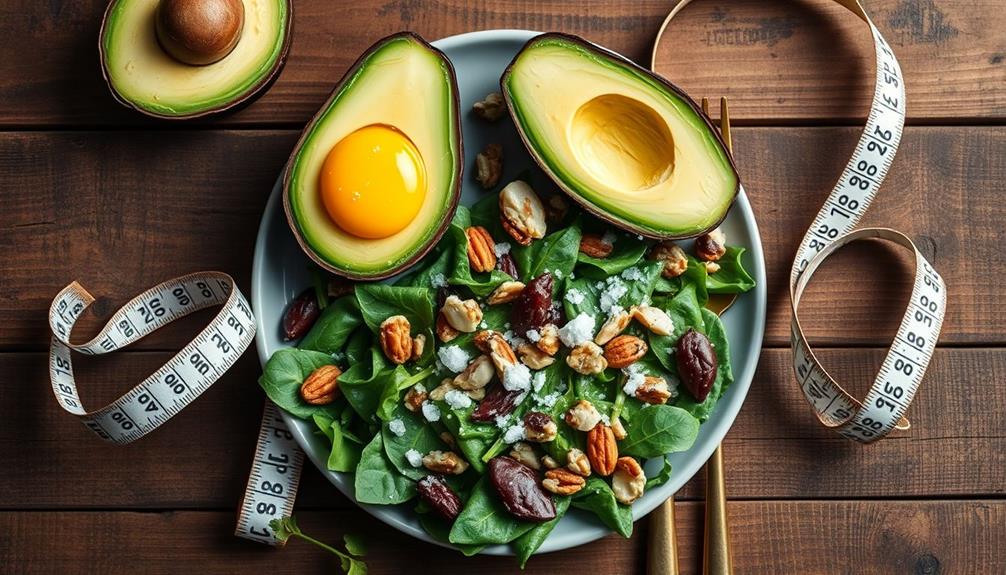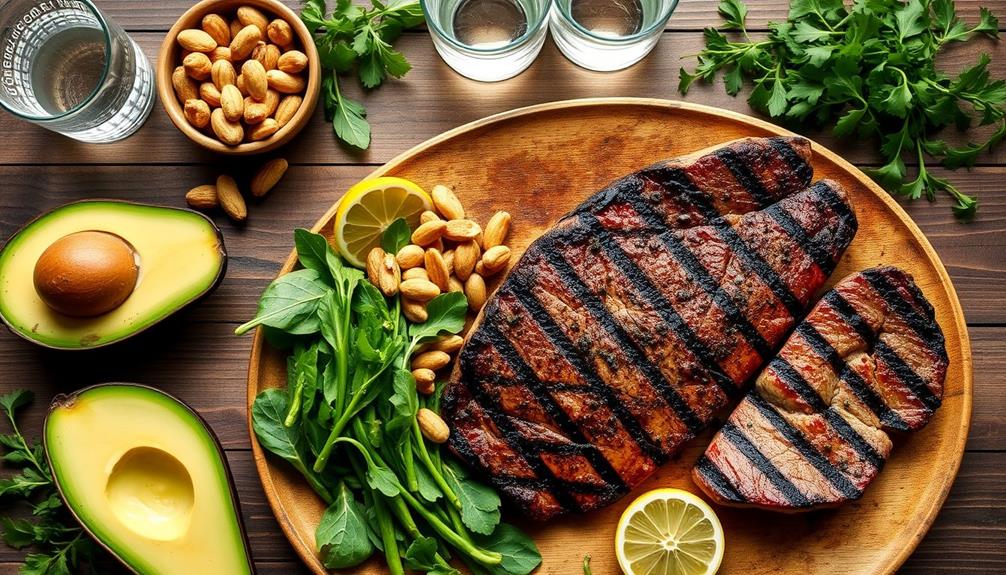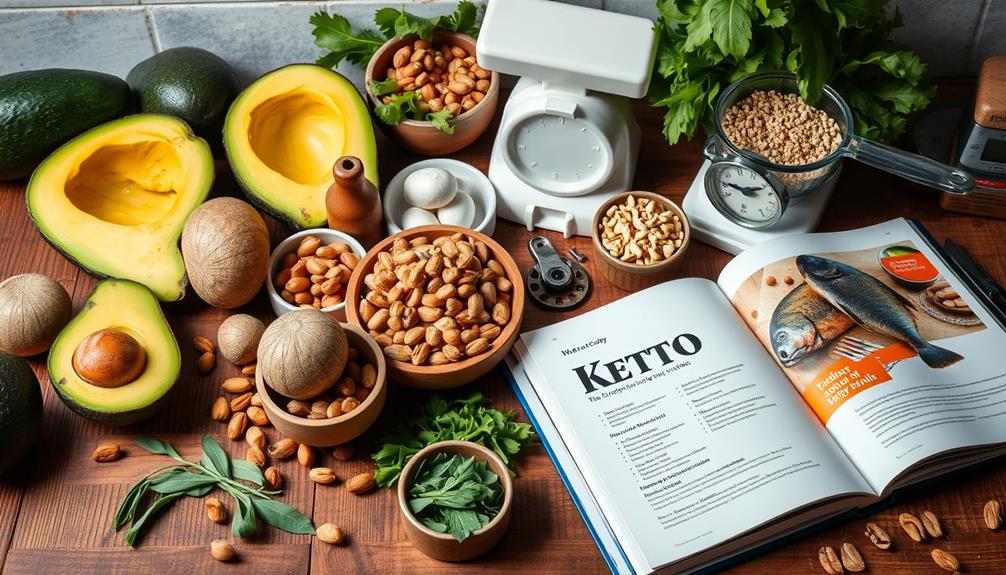Yes, the ketogenic diet can be good for managing fatty liver disease. By focusing on high-fat, low-carb foods, it helps promote weight loss and improve liver health. Research shows that following a keto diet can reduce intrahepatic triglyceride content by about 31% and improve insulin sensitivity. You'll also see notable drops in triglycerides and insulin levels, which can greatly benefit your liver. However, it's important to approach this diet mindfully and monitor your liver function regularly. If you're curious about specific foods and strategies to support your journey, there's more valuable information for you to explore. It’s also important to note that while the ketogenic diet may be beneficial for managing fatty liver disease, it may not be suitable for individuals with advanced liver disease such as cirrhosis. In these cases, a high-fat diet can exacerbate symptoms and put additional stress on the liver. It’s crucial to consult with a healthcare professional before making any significant changes to your diet, especially if you have a pre-existing liver condition. They can provide personalized guidance and support to ensure that you’re making the best choices for your overall liver health. When it comes to the keto diet and cirrhosis, it’s important to prioritize safety and individualized care.
Key Takeaways
- The ketogenic diet can significantly reduce intrahepatic triglyceride content by about 31%, benefiting those with fatty liver disease.
- Improved insulin sensitivity from keto helps reduce liver fat storage, crucial for managing non-alcoholic fatty liver disease (NAFLD).
- A focus on healthy fats and nutrient-dense foods in the keto diet supports liver health and reduces inflammation.
- Regular monitoring of liver function and ketone levels is essential to ensure safe adherence to the ketogenic diet.
- Consultation with healthcare professionals can provide tailored dietary advice for effective management of fatty liver while on a ketogenic diet.
Understanding Fatty Liver Disease
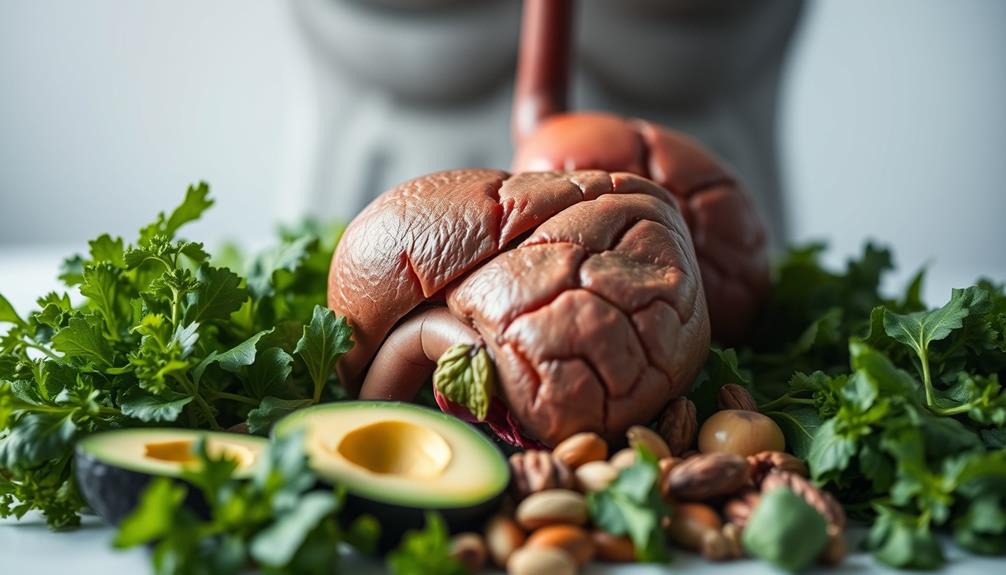
Understanding Fatty Liver Disease is essential for anyone looking to maintain a healthy lifestyle. Non-alcoholic fatty liver disease (NAFLD) is a condition where fat accumulates in the liver without the influence of alcohol, affecting a significant portion of the population.
Risk factors for developing NAFLD include obesity, insulin resistance, type 2 diabetes, high cholesterol, and hypertension. It's vital to recognize that even if you're not showing symptoms, the liver can still be impacted. Incorporating a balanced diet rich in fruits and vegetables can also support liver health and mitigate some of these risk factors, as highlighted in effective strategies for weight loss.
The main focus of treatment for nonalcoholic fatty liver disease revolves around weight loss. Losing just 3-5% of your body weight can lead to a noticeable decrease in liver fat content and inflammation, promoting better liver health.
Many people find that adopting a ketogenic diet can be beneficial in this regard, as it emphasizes low-carb intake, which may help improve insulin sensitivity and support weight management.
If left unaddressed, NAFLD can progress to more serious conditions like cirrhosis or hepatocellular carcinoma. By understanding this disease and its risk factors, you empower yourself to take proactive steps toward a healthier liver and overall well-being.
Symptoms and Risk Factors
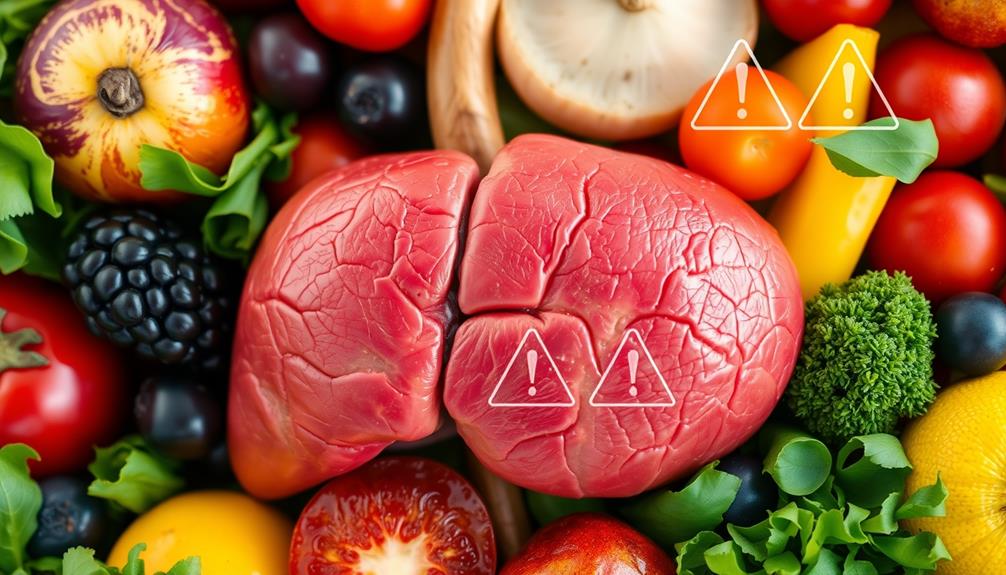
Nonalcoholic Fatty Liver Disease (NAFLD) often sneaks up on you, remaining asymptomatic in its early stages. As the condition progresses, you might notice symptoms like fatigue, abdominal discomfort, or even jaundice.
It's essential to recognize these signs early because about 30-40% of Americans are affected by fatty liver disease, making it a significant public health issue. Understanding dietary choices can greatly impact your liver health and help manage symptoms.
Several risk factors contribute to developing NAFLD. Obesity and Type 2 diabetes are major ones, as they often lead to insulin resistance, which promotes liver fat accumulation.
Additionally, high cholesterol and hypertension can exacerbate the condition. If you're middle-aged or older, you're also at a higher risk, particularly if you belong to Hispanic or non-Hispanic white populations.
Your dietary choices play an important role in managing these risk factors. High fructose intake and processed foods can worsen liver fat accumulation, while a ketogenic diet may offer a promising alternative.
Causes of Fatty Liver

Fatty liver disease stems from several interrelated causes that often revolve around lifestyle choices and metabolic factors. One of the primary culprits is nonalcoholic fatty liver disease (NAFLD), which often develops in individuals suffering from obesity and insulin resistance. These conditions cause excessive fat accumulation in the liver, leading to serious health issues.
Additionally, understanding your credit score can be imperative when managing healthcare costs related to fatty liver disease.
High fructose consumption, particularly from sugary beverages and processed foods, considerably contributes to liver fat. This dietary pattern can worsen insulin resistance, creating a vicious cycle for your liver health.
Additionally, using vegetable oils high in omega-6 fatty acids has been linked to fatty liver development, as they promote fat accumulation in the liver.
Dietary choline intake is another essential factor; insufficient levels hinder the liver's ability to export fat effectively. Foods rich in choline, such as fish, eggs, and beef liver, play a significant role in maintaining liver health.
The prevalence of NAFLD is remarkably higher in those with obesity and metabolic syndrome, affecting approximately 30-40% of the American population. Addressing these causes is fundamental for preventing and managing fatty liver disease.
The Keto Diet Explained
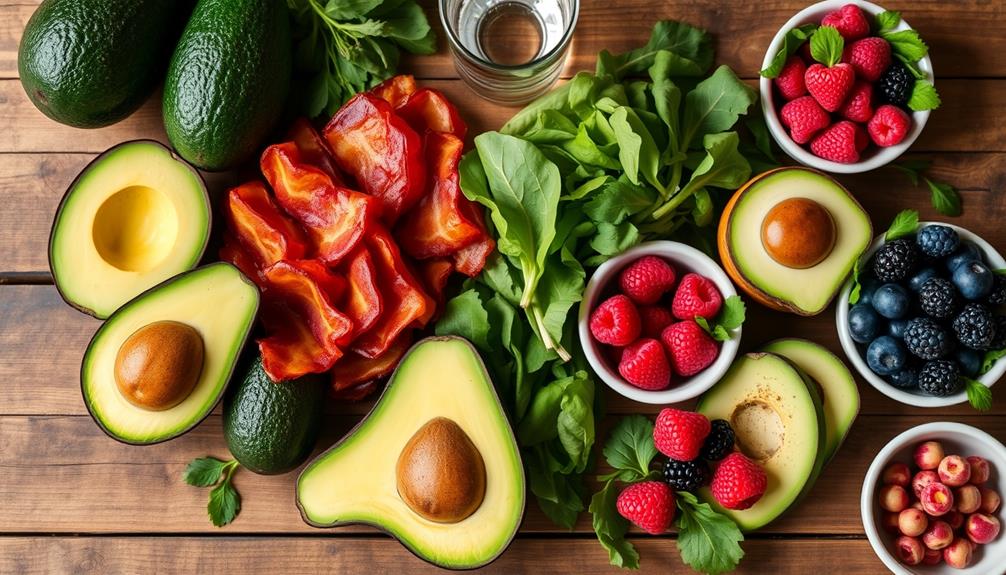
The ketogenic diet offers a transformative approach to nutrition, focusing on high fat and low carbohydrate intake to shift your body into a state of ketosis. Typically, the keto diet consists of 70-80% fat, 15-25% protein, and only 5-10% carbohydrates.
By drastically reducing carbohydrate intake, your body changes its primary energy source from glucose to ketones, which are produced from fat breakdown in the liver. This dietary shift can also lead to increased antioxidant levels, which are beneficial for overall health, as seen in various dietary practices like juice diets.
This high-fat diet promotes significant weight loss and improves metabolic markers, including reductions in triglycerides and insulin levels. Research shows that the ketogenic diet can decrease intrahepatic triglyceride (IHTG) content by approximately 31% in individuals with nonalcoholic fatty liver disease (NAFLD).
As you commence this low-carbohydrate diet, it's crucial to monitor your liver function and overall health closely. While the keto diet can effectively reduce liver fat, it may also cause transient disturbances in liver enzymes and metabolic processes.
Understanding how the ketogenic diet works is important for anyone considering it, especially those with fatty liver disease. By embracing this dietary shift, you could potentially enhance your liver health and overall well-being.
Keto Diet's Effects on Fatty Liver

Research shows that following a ketogenic diet can greatly impact liver health, particularly for those dealing with fatty liver conditions. The keto diet has been found to reduce intrahepatic triglyceride (IHTG) content by about 31%, signaling a significant decrease in liver fat accumulation. This is especially important for managing nonalcoholic fatty liver disease (NAFLD), as improved insulin sensitivity helps reduce liver fat storage.
Additionally, incorporating certain dietary adjustments, such as reducing high-purine items, may further support liver health and overall metabolic function cold medications overview.
Clinical studies reveal that participants on the keto diet experienced a 25% reduction in plasma triglyceride concentrations and a 53% decrease in insulin levels, leading to better overall liver health. Enhanced mitochondrial β-oxidation and metabolic adaptations during the ketogenic diet promote improved fatty acid metabolism and reduced liver inflammation, which are vital for addressing fatty liver disease.
However, it's important to monitor liver function while on the keto diet. Some individuals may initially experience increased liver enzyme levels, which highlights the need for careful dietary management.
Recommendations for Keto and Liver Health
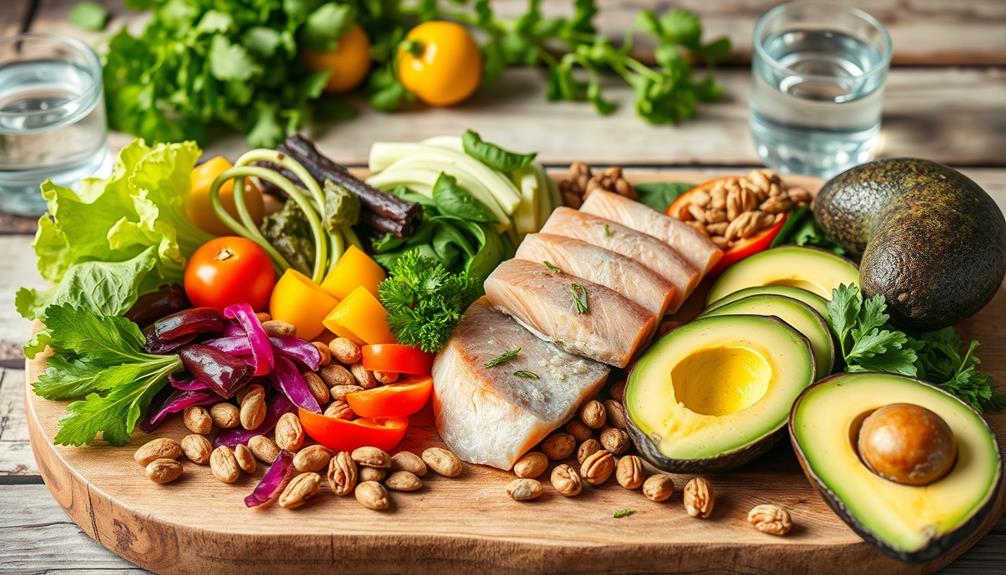
To maintain liver health while on the keto diet, focus on nutrient-dense food choices that support your body's needs, such as incorporating healthy fats and avoiding processed foods.
It's also important to reflect on the potential impact of emotional well-being on overall health, as conditions like Borderline Personality Disorder (BPD) can affect lifestyle choices and eating habits.
Regularly monitoring your liver function is essential to catch any potential issues early.
Nutrient-Dense Food Choices
Choosing nutrient-dense foods is essential for anyone on a ketogenic diet, especially if you're managing fatty liver. Focus on whole foods like fatty fish, avocados, and leafy greens, as these support liver health and help reduce inflammation.
Incorporating choline-rich foods, such as eggs and beef liver, can also be beneficial, as choline plays a significant role in fat export from the liver and may help mitigate the risk of non-alcoholic fatty liver disease (NAFLD) progression. Additionally, incorporating essential oils such as eucalyptus oil into your wellness routine can support respiratory health, which is critical for overall well-being.
You should prioritize healthy fats from sources like olive oil and nuts, which can improve metabolic markers in individuals with fatty liver disease. These fats not only provide energy but also contribute to an overall anti-inflammatory effect.
It's equally important to limit processed foods and sugars, particularly high-fructose corn syrup, as these can exacerbate liver fat accumulation and inflammation.
Gradually implementing the ketogenic diet while emphasizing balanced nutrient intake can lead to better adaptation and potentially enhance liver health outcomes. By making mindful food choices, you're setting the stage for improved liver function and overall well-being.
Regular Monitoring Required
Monitoring your health while following a ketogenic diet is vital, especially when managing fatty liver. Regular monitoring helps you stay informed about your liver health and guarantees you're on the right track. Here are some key aspects to focus on:
- Liver function tests: Regularly check ALT and AST levels to detect any potential issues early. This is particularly important since a diversified approach to health can provide insights into overall well-being, similar to how IRA rollovers can diversify retirement portfolios.
- Blood ketone levels: Assess these frequently to guarantee safe adherence to the ketogenic diet and avoid hyperlipidemia.
- Lipid profiles: Monitor changes in LDL cholesterol and triglyceride levels, as they can impact cardiovascular risk.
- Liver fat content: Consistent follow-ups are vital to evaluate the long-term effects on your liver health.
Consulting with healthcare providers, including registered dietitians and medical professionals, is vital for personalized monitoring strategies tailored to your individual health conditions and dietary needs.
While studies show significant reductions in liver fat content among ketogenic diet participants, the importance of ongoing assessments can't be overstated. By prioritizing regular monitoring, you can effectively manage your liver health while enjoying the benefits of a ketogenic diet.
Frequently Asked Questions
Can You Do Keto if You Have Fatty Liver?
You can do keto if you have fatty liver, but it's vital to consult your healthcare provider first. They'll help tailor the diet to your needs, ensuring it's safe and effective for your condition.
What Is the Best Diet to Get Rid of a Fatty Liver?
To get rid of a fatty liver, focus on a balanced diet rich in high-fiber foods, lean proteins, and healthy fats. Gradual weight loss and avoiding processed foods will help improve your liver health considerably.
Is a Keto or Mediterranean Diet Better for Fatty Liver?
"Don't put all your eggs in one basket." When choosing between keto and Mediterranean diets for fatty liver, consider your lifestyle. Each offers benefits, but Mediterranean's flexibility may promote long-term adherence and overall liver health better.
What Carbs Should I Eat With a Fatty Liver?
You should focus on whole, unprocessed carbohydrates like quinoa, brown rice, and sweet potatoes. Incorporate fruits like berries and apples, while limiting sugary foods. This balanced approach supports your liver health effectively.
Conclusion
In summary, embracing the keto diet might just be the ticket to improving your fatty liver health. By reducing carbs and increasing healthy fats, you could potentially reduce liver fat and inflammation. However, it's essential to consult with your healthcare provider before diving in. Remember, every cloud has a silver lining, and with the right approach, you can work towards a healthier liver and a better quality of life. Take the plunge, but do it wisely!

